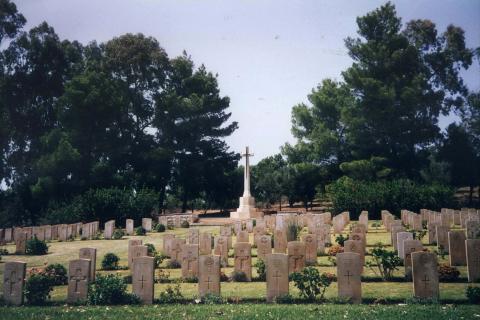Captain E R Willoughby Radcliffe was the son of Mr and Mrs A N Radcliffe, and the husband of V E Radcliffe, of Braintree, Essex. In peacetime he had been a successful solicitor and at 43 years old was quite a bit older than most officers in the 1st Parachute Brigade. He was considered a great authority on many subjects and his Commanding Officer, Lt Col 'Johnny' Frost, held him in high regard. He served as the Adjutant of 2nd Parachute Battalion in the North African campaign, during Op Torch in Tunisia.
In March 1943 the 2nd Battalion were transported to the Tamera Valley having cleared a couple of prominent landmarks in the Beja sector. They were instructed to take over a hill feature with steep sides and covered in cork oak woods at Sidi Mohammed el Kassim from the Lincolns. Unsurprisingly this home became known to the men as ‘Cork Wood’. The subsequent engagement at Cork Wood also became known as the Battle of Tamera.
Conditions at Cork Wood were often extremely uncomfortable and hostile. The trees restricted visibility on some parts of the hill and also added to the hazards from shelling and strafing. The cover enabled the enemy in certain places to arrive undetected within 20 yards of the battalion frontline positions and to infiltrate in between the defences. During their occupation of the hill, rain filled their trenches and the wet weather meant clothing, boots and blankets were soaked and covered in sticky red mud. As a result the men were frequently wet and cold. The mud and slush often made movement up and down the slopes difficult. While occupying these defensive positions the battalion was subject to an onslaught of shelling, mortaring and strafing by enemy aircraft.
On the 8th March an enemy force of divisional strength comprising four regiments attacked the defensive positions of the 1st and 2nd Battalions. During the early part of the attack A Company became completely surrounded. Although they managed to hold their positions and force the enemy back, their ammunition stocks were running perilously low. Desperately frustrated with the situation Captain Radcliffe, without thought for his personal safety, organised and led a small mule train loaded with ammunition to provide some relief for A Company. However, on the way they ran into the enemy and Captain Radcliffe was killed in the ensuing firefight.
Captain Radcliffe died on 8 March 1943, aged 43 years old. He is now buried at Tabarka War Cemetery, Tunisia.
Further reading:
Maj Gen John Frost, A Drop Too Many, (2002), Pen & Sword.
Compiled for ParaData by Harvey Grenville
Read More

Latest Comments
There are currently no comments for this content.
Add Comment
In order to add comments you must be registered with ParaData.
If you are currently a ParaData member please login.
If you are not currently a ParaData member but wish to get involved please register.